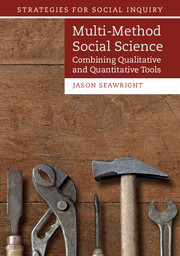Book contents
- Frontmatter
- Contents
- List of Figures and Tables
- Acknowledgments
- 1 Integrative Multi-Method Research
- 2 Causation as a Shared Standard
- 3 Using Case Studies to Test and Refine Regressions
- 4 Case Selection after Regression
- 5 Combining Case Studies and Matching
- 6 Combining Case Studies and Natural Experiments
- 7 Embedding Case Studies within Experiments
- 8 Multi-Method Case Studies
- Appendix: Qualitative Causal Models and the Potential-Outcomes Framework
- References
- Index
2 - Causation as a Shared Standard
Published online by Cambridge University Press: 05 September 2016
- Frontmatter
- Contents
- List of Figures and Tables
- Acknowledgments
- 1 Integrative Multi-Method Research
- 2 Causation as a Shared Standard
- 3 Using Case Studies to Test and Refine Regressions
- 4 Case Selection after Regression
- 5 Combining Case Studies and Matching
- 6 Combining Case Studies and Natural Experiments
- 7 Embedding Case Studies within Experiments
- 8 Multi-Method Case Studies
- Appendix: Qualitative Causal Models and the Potential-Outcomes Framework
- References
- Index
Summary
The central thesis of this book is that causal inferences based on careful integrative multi-method research designs have advantages over similar inferences that rely on only one method. A necessary first step in making this argument is showing that many applications of qualitative and quantitative methods in the social sciences share an underlying notion of causation. If causation in these two methodological traditions is fundamentally not the same sort of relation, then there is good reason to worry that they cannot contribute to a joint causal project. Indeed, given such fundamentally divergent worldviews, it is unclear that the methods could even contribute to testing each others’ assumptions – the central theme of integrative multi-method research designs.
I argue below that the potential-outcomes framework, in which causal effects are characterized as the difference between what actually happens in a given case and what would have happened had that case been assigned to a different treatment category, can serve as that notion. After introducing this concept, I argue that stereotypically qualitative and quantitative causal thinking can be seen as sharing an underlying conceptual structure. The potential-outcomes framework is used to explicate causal models and hypotheses throughout the book.
Existing work on the potential-outcomes framework has produced clear insights into the challenges of causal inference. Most famously, authors have pointed to the fundamental problem of causal inference: because it is impossible to observe both what does happen to a case in reality and what would have happened to that case had the independent variable been assigned a different value, no direct empirical observation of causation at the case level is possible (Holland 1986). Prior research also provides detailed findings regarding the assumptions necessary to get around this problem and make causal inferences in experiments, natural experiments, and quantitative observational studies (e.g. Morgan and Winship 2007). The last segment of this chapter reviews those findings with respect to regression-type analysis of observational studies, paying special attention to the assumptions about control variables necessary for regression-based causal inference. In particular, this literature shows that scholars need independent evidence that the regression does not suffer from confounders, colliders, or post-treatment bias. While these assumptions are not sufficient for causal inference, they are necessary and provide key openings for integrative multi-method research design.
- Type
- Chapter
- Information
- Multi-Method Social ScienceCombining Qualitative and Quantitative Tools, pp. 19 - 44Publisher: Cambridge University PressPrint publication year: 2016

